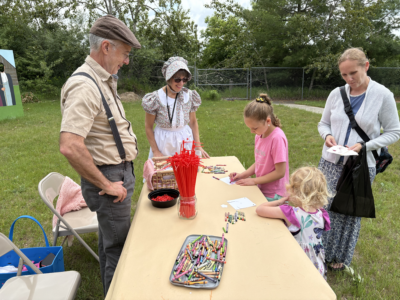Groups warn of drinking water dangers, tell how to help

News Photo by Mike Gonzalez From left, Brandon Schroeder, Kevin Prevost, Charlie Doan, Teresa Salveta, and Mary Alice Comar are seated in front of an audience on Wednesday evening in a classroom at Alpena Community College. Comar moderated a roundtable with four water officials about water safety challenges in Northeast Michigan.
ALPENA — Items as small as a cigarette butt on the road or as big as a herd of dirt-covered cattle can easily lead to drinking water contaminants, according to the participants in a Wednesday roundtable discussion at Alpena Community College.
Four officials from different health and environmental organizations came together on Wednesday evening for a two-hour discussion on the challenges they face every day to keep water around Northeast Michigan safe and how the public can help out.
“If you’re in a livestock farm, all those cattle are nice to look at out in the field, but they go number two a lot,” Brandon Schroeder, Michigan State University County Extension Sea Grant educator, said. “And if that’s not contained properly, it ends up where? Lake Huron or the Thunder Bay River. Farmers in our community are now cognizant of this, but some don’t even realize they have an issue until someone comes in and asks about things.”
The roundtable participants explained that anything touching water has the potential for its chemicals or materials to stay in the liquid and move to storm drains and anywhere else the water goes.
Some of those contaminants are easy to clean and extract, but some have stayed in the water for decades, such as per- and polyfluorinated substances, or PFAS, often referred to as “forever chemicals.”
“Plastic was like the most awesome thing when it came about, but now we’re finding microplastics that keep breaking apart into tinier pieces,” Teresa Salveta, a member of the Water Resources Division at the Michigan Department of Environment, Great Lakes, and Energy, said. “I think, as humans, we’re kind of shortsighted. We want this awesome thing, but it takes us decades to figure out that maybe that was a problem. You might hear that Michigan has a bad PFAS problem, but I would like to say we’re the ones looking for it. If you think other states don’t have a PFAS problem, it’s probably because we’re actually looking for it and dealing with that stuff.”
About 20 individuals, either in person or via Zoom, attended the event and asked questions about how to dispose of everyday products such as car oil or turpentine.
Others questioned what should get flushed down the toilet.
“The only thing you should flush down the toilet comes out your body,” Kevin Prevost, District Health Department No. 4 environmental health director, said. “And obviously the paper, but the flushable wipes are not a real thing. They say they’re biodegradable, but they’re really just a huge problem. They like to make friends with all the oils and greases that you put down your drain called fatbergs. It’s a real headache for your municipal wastewater treatment plants.”
Many of those issues are the consequence of human actions. Something as simple as fertilizing the lawn may create a negative impact if too much is used and rain runoff picks up some of the manure, the roundtable participants said.
The participants recommended that the public remain cognizant of their actions, properly dispose of materials, and vote for elected officials who push for more funding for environmental work.



